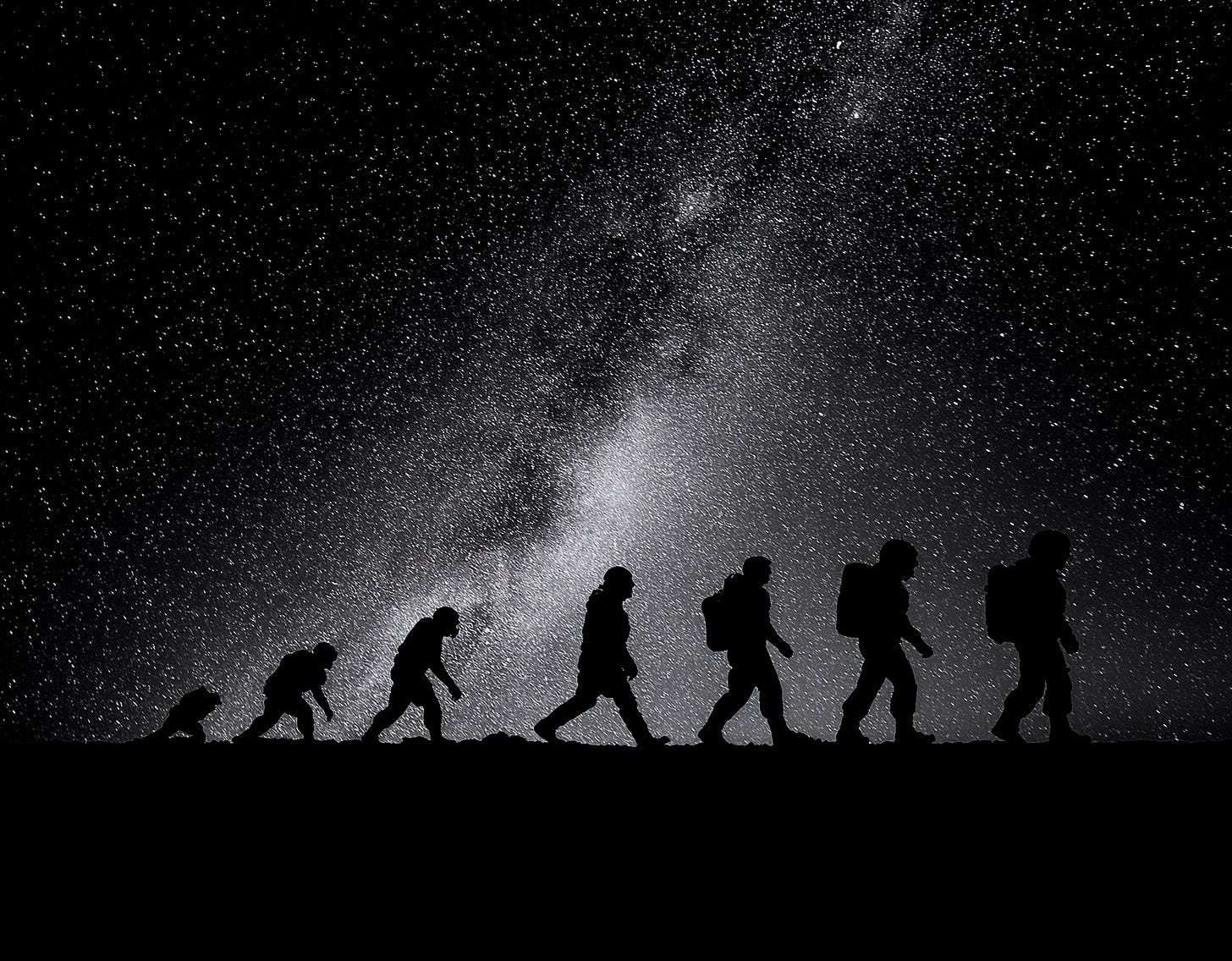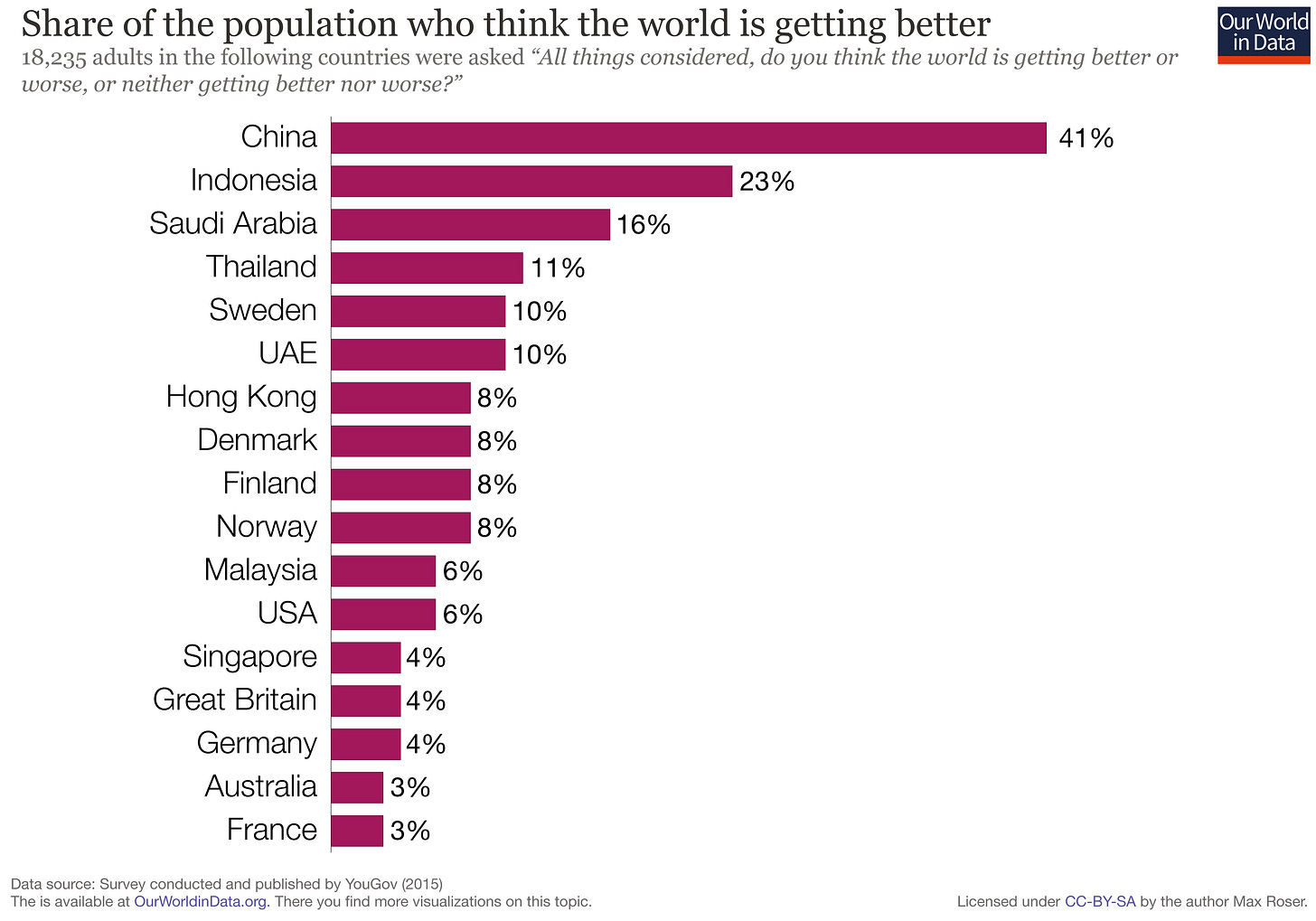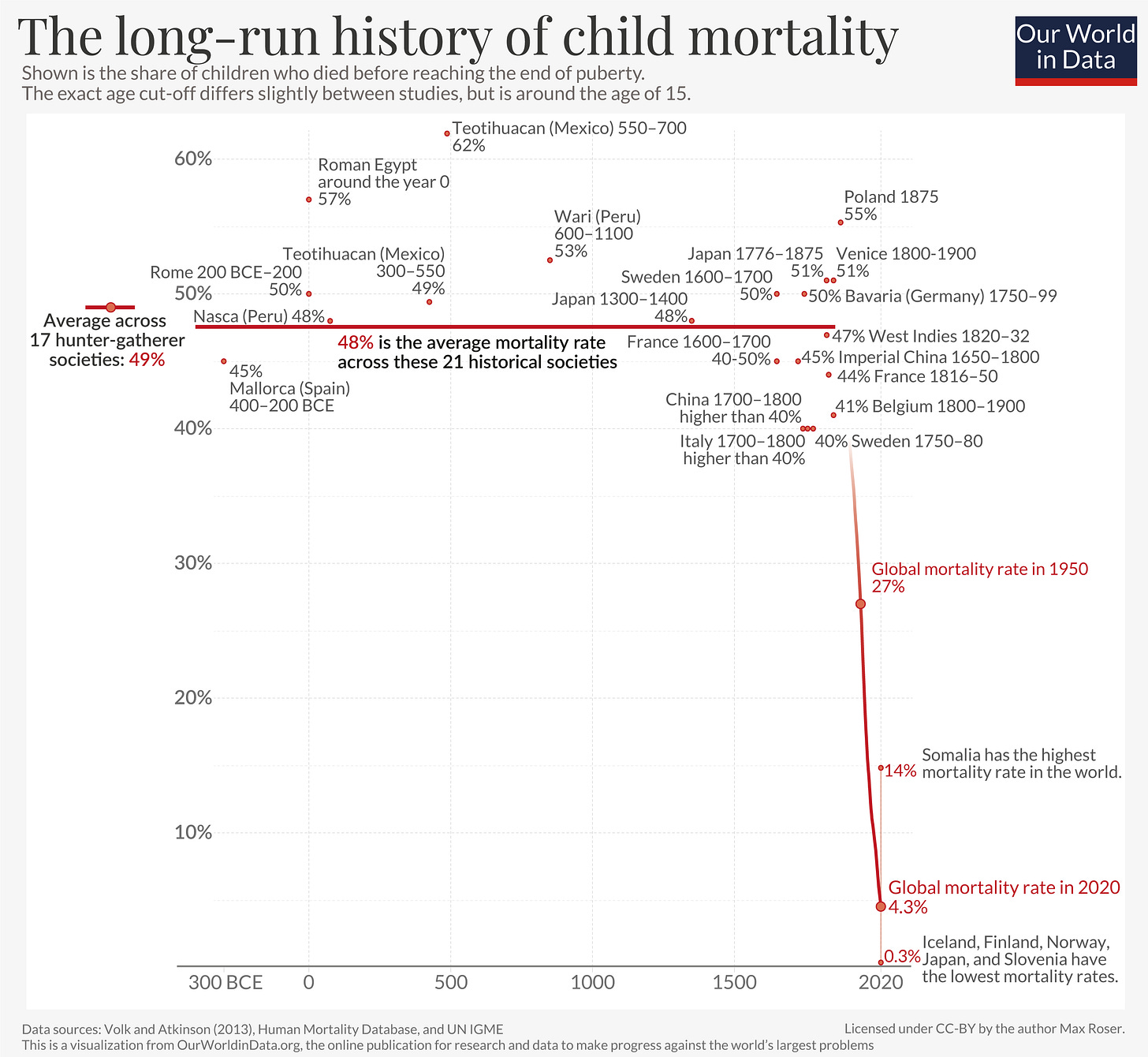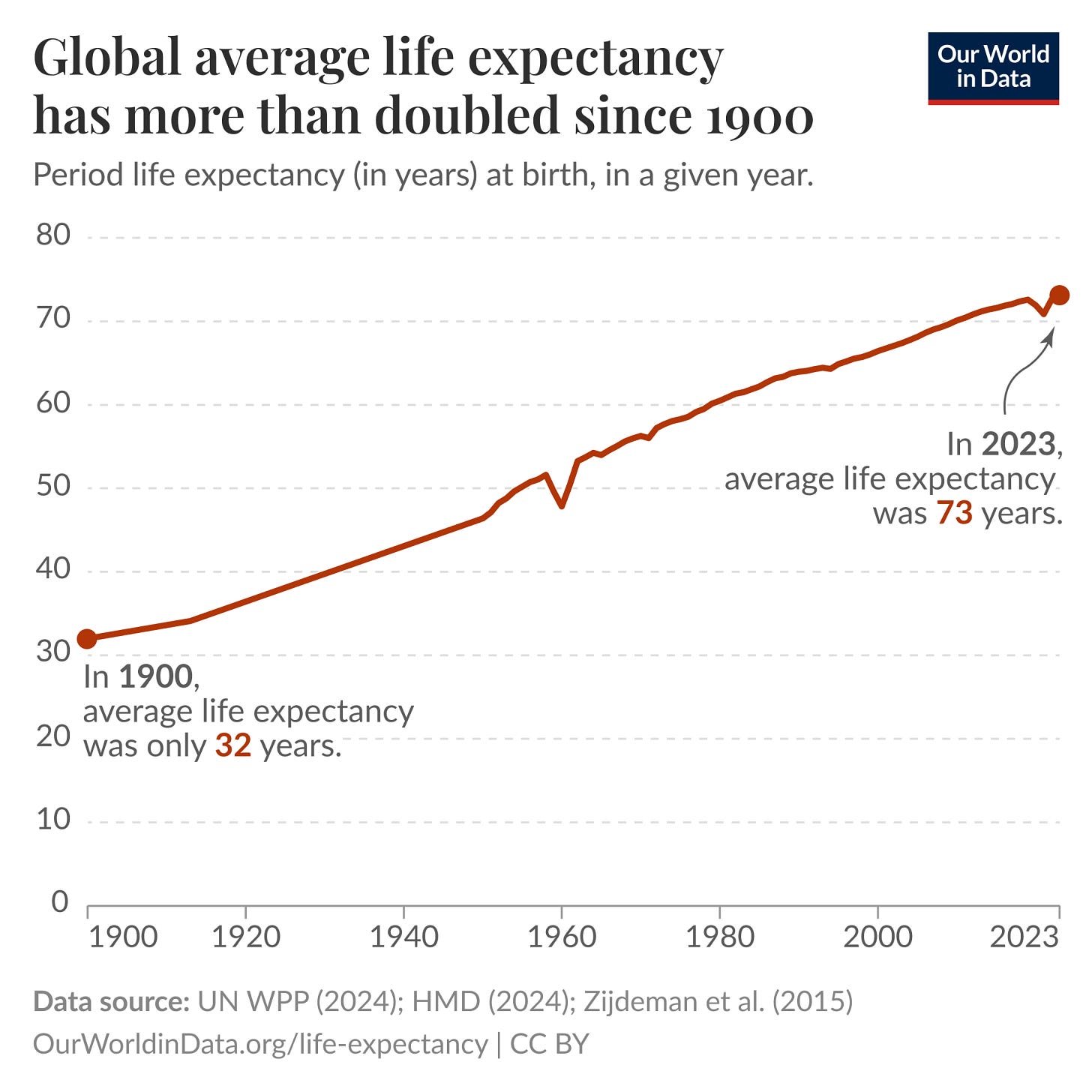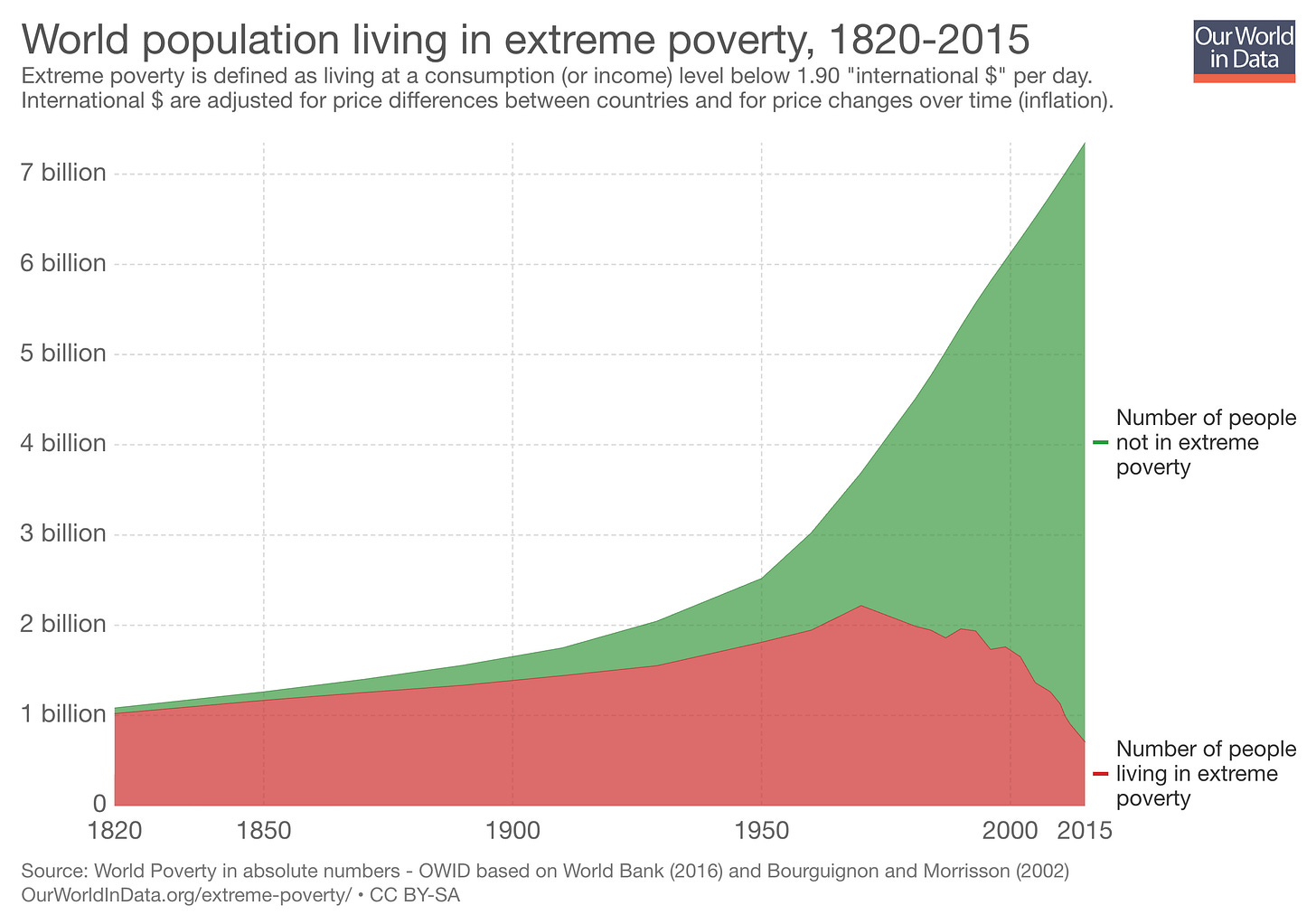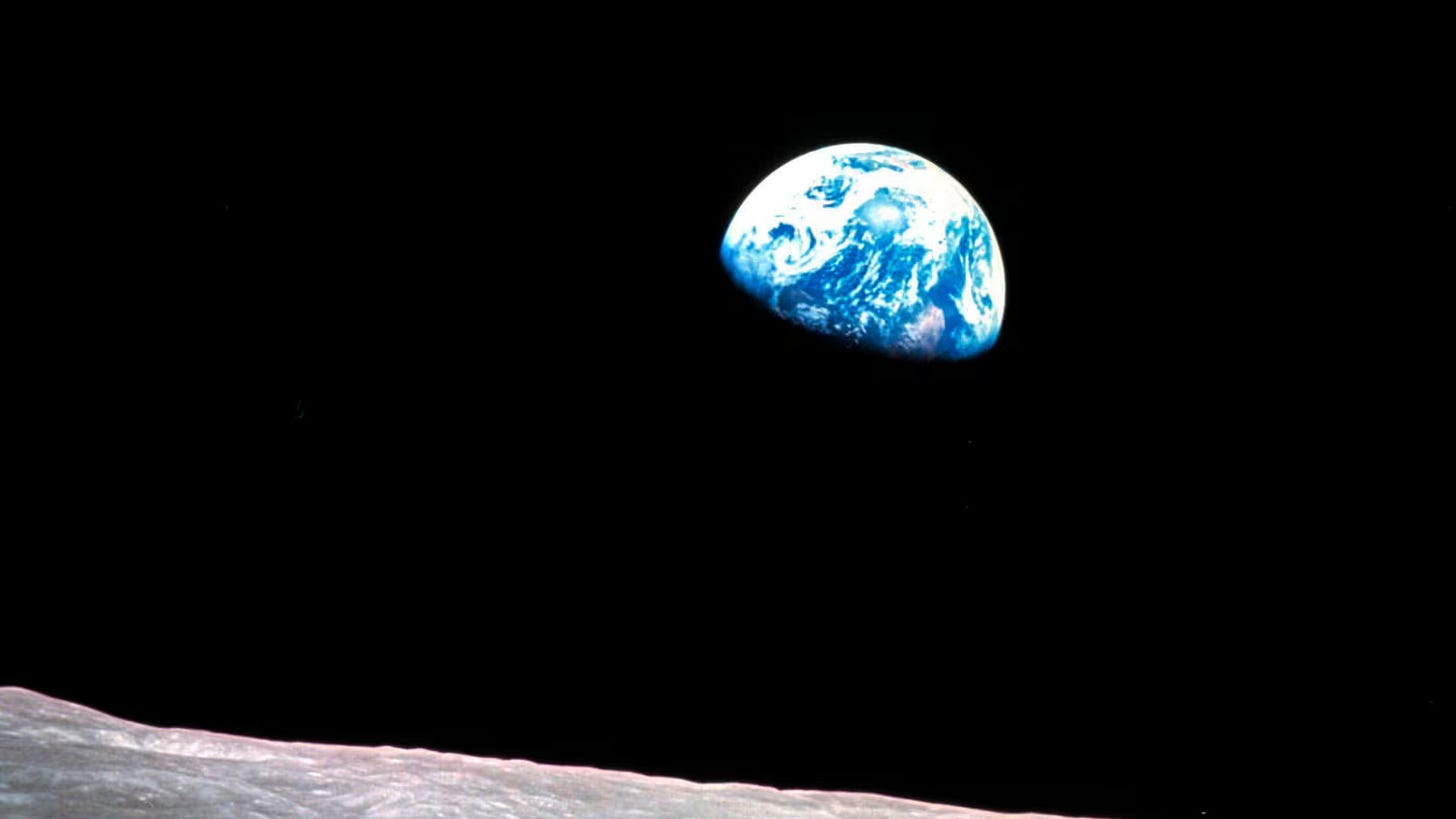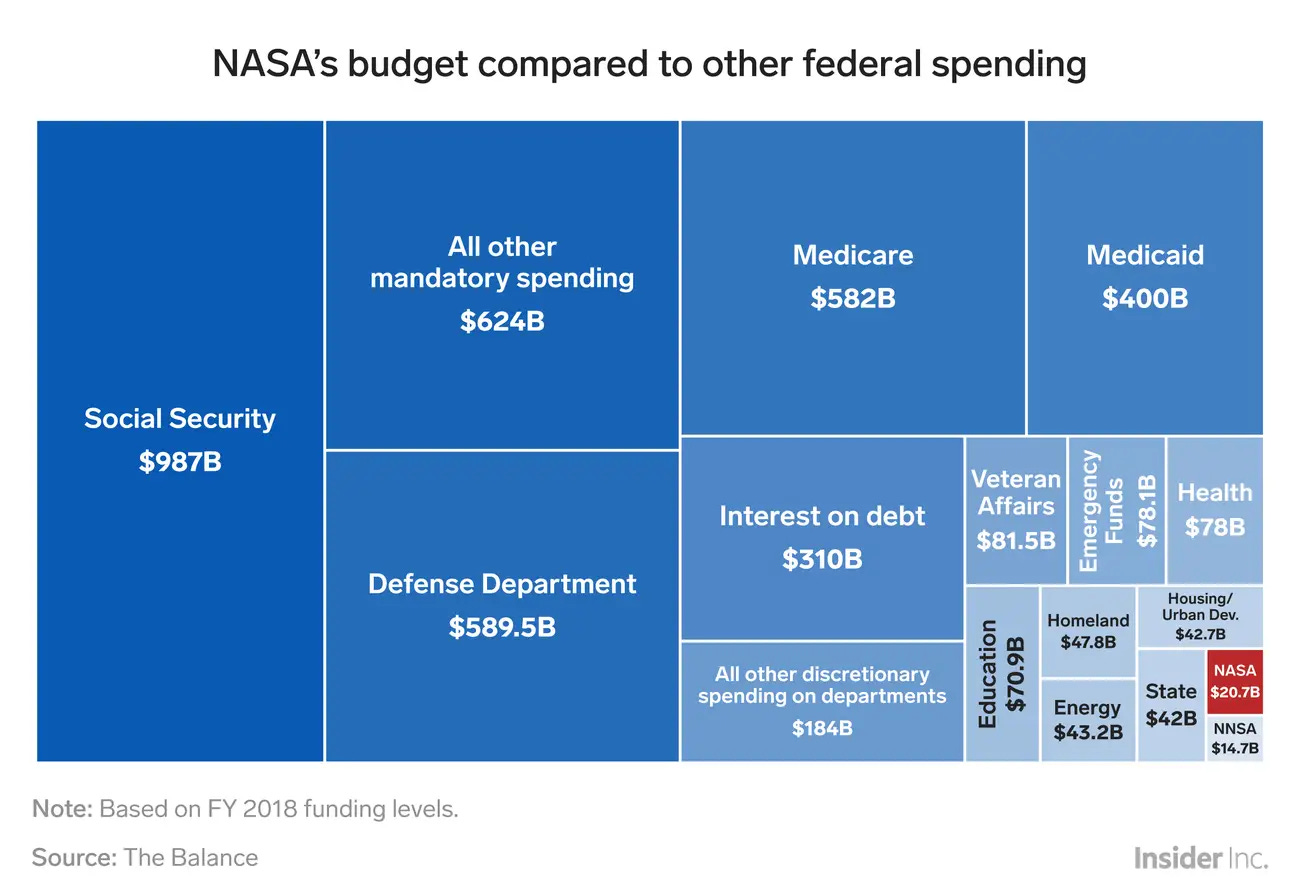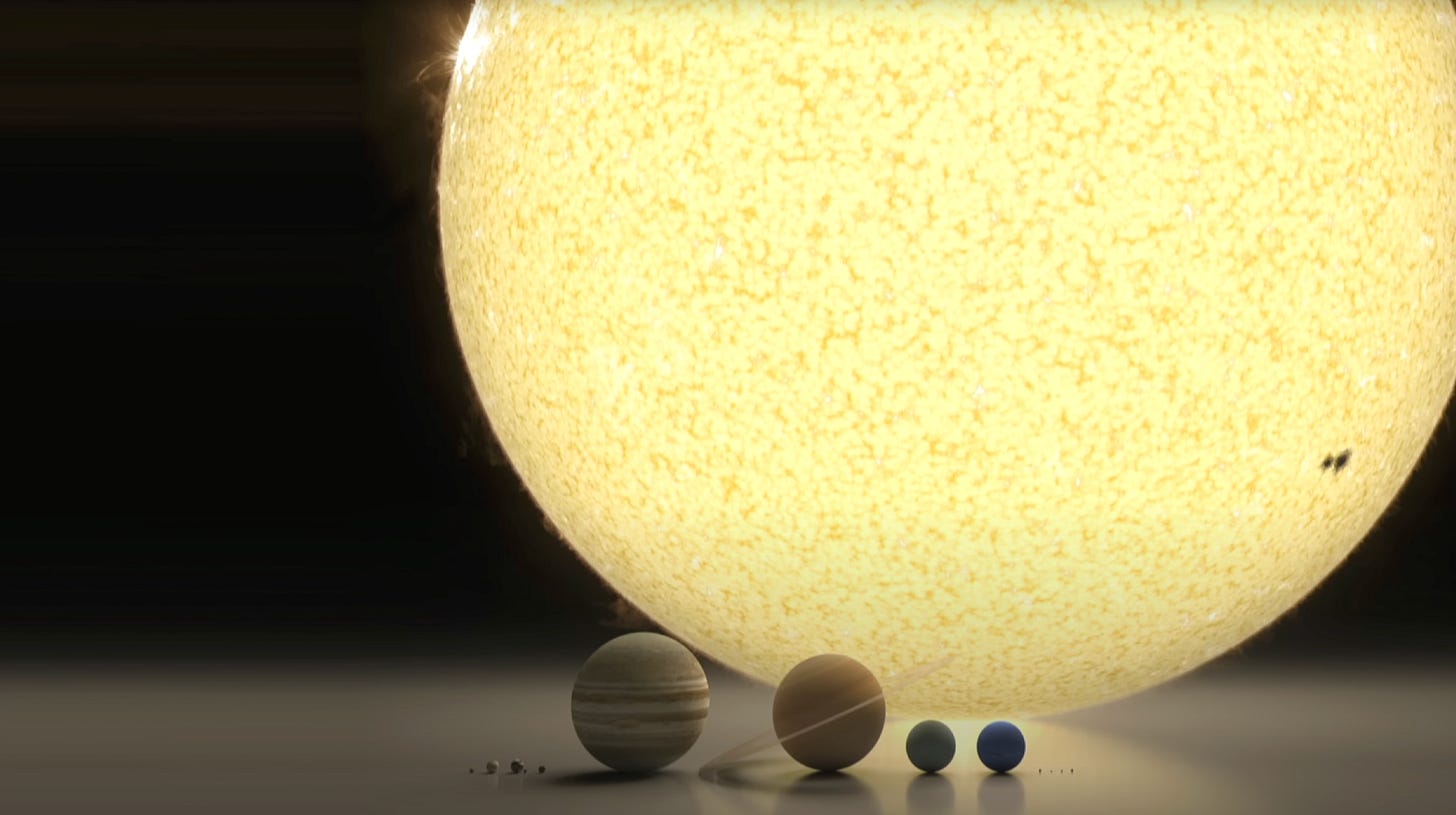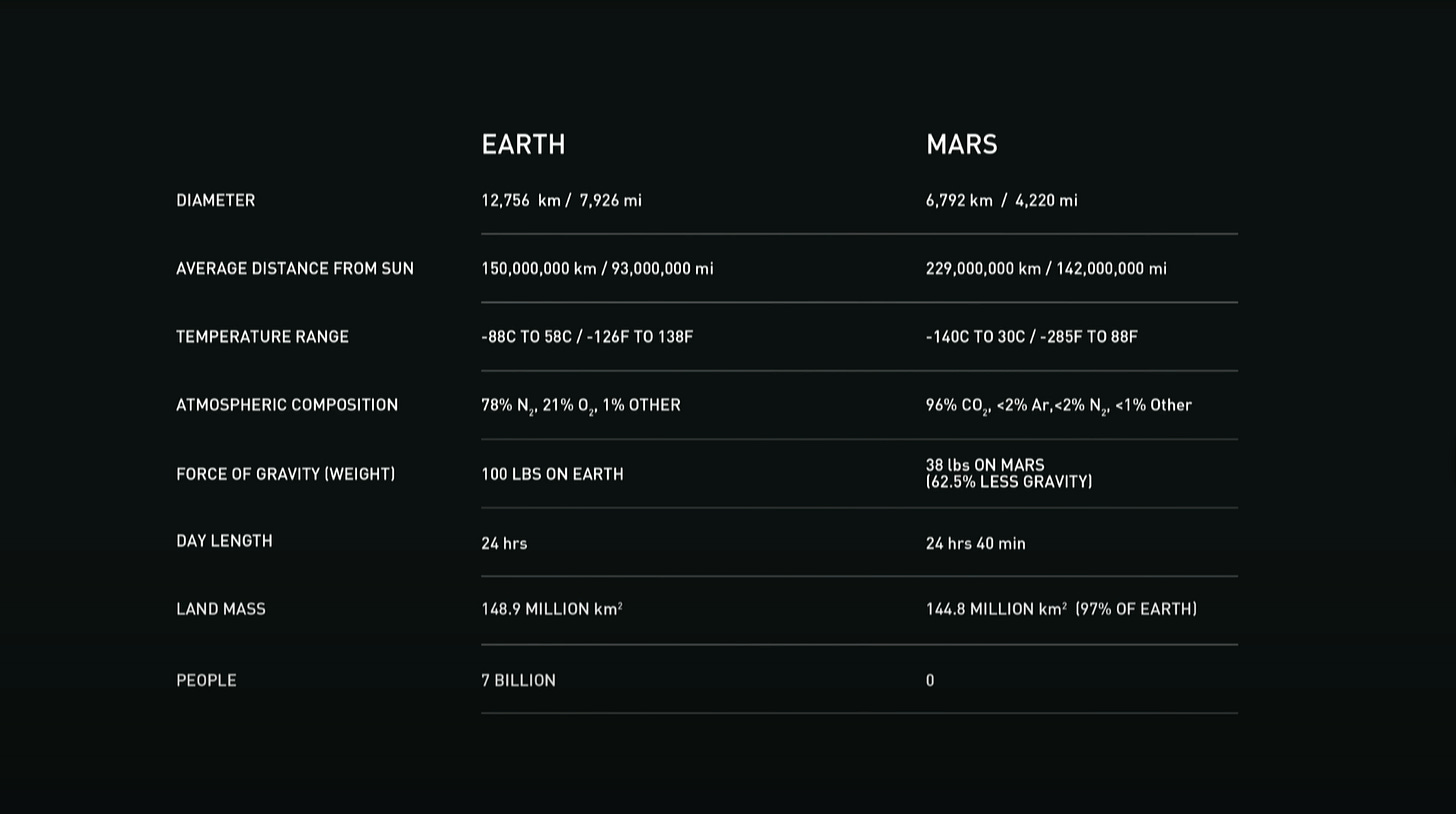Why Humanity Must Go Multiplanetary
We are at the precipice of an enormous crossroads
“We think of life as confined to a single planet. But the nature of life is to spread. To seek out new horizons. To take root on foreign shores, in search of new soils. To make its mark on the cosmos.”
We’re in a Cave Right Now…
“You’re a cavewoman, I’m a caveman…” Neil deGrasse Tyson says to the reporter who asked him: “Why go to space when we have problems on Earth?”.
“…and we’re in a cave, and there’s a mountain and a valley over there, and I tell you: ‘I wanna explore that mountain and that valley.’ But you say: ‘No, we can’t afford to send you out there now, we have to solve the cave problems first, before anyone leaves the cave!’”
We laugh at that. It’s an absurd claim to make in caveman days, because there are solutions to your problems that might exist, and time has demonstrated likely exist by leaving the cave and discovering.
Space Exploration has Never Been Popular
When we first landed on the moon in 1969, what do you think public sentiment for space exploration was like? If you assumed in favor, you would be wrong. It was overwhelmingly negative.

The average person today unfortunately knows very little about space or space exploration. This is understandably because it doesn’t affect them. It feels unachievable, detached from everyday life.
Ask someone off the street, and you will likely hear the following about space:
Waste of resources
Dangerous, impractical
A distraction from Earth’s problems
For the rich only
Overhyped, not possible, futile
These can seem reasonable. One looks around and sees all the suffering here on earth, and suddenly space exploration seems like a gratuitous luxury. Maybe man should first perfect the Earth before he tries to go into space?
Wait, We’re not Ready Yet…
But this is a short-sighted and ever-incorrect understanding of history.
Humans didn’t eradicate extreme poverty by trying to optimize our hodgepodge hunter-gatherer system — we built farms. We did not connect the world by breeding faster horses or carrier pigeons — we invented cars and iPhones.
We don’t know what we don’t know. It’s a story as old as time. The unknown unknowns are what change the world.
Expecting any type of exploration to justify its costs by predicting all the amazing things it will discover would be akin to expecting Christopher Columbus, when he was lobbying Queen Isabella for ships, to predict the polio vaccine or Netflix.
But Everything on Earth is just so Bad!
“We are not just negative about the past, we are also pessimistic about the future.”
It’s actually… not. We’ll get to that in a second.
Our perception of how the world is changing really matters for what we believe is possible in the future. When asked, “All things considered, do you think the world is getting better or worse?” very few people gave a positive answer. In France and Australia, only 3%!
On the whole, we do not only believe that the world is stagnating or declining, we also expect that this perceived stagnation and decline will continue into the future!
This pessimism about what is possible for the world matters. Those who don’t expect things to get better in the first place will be less likely to act in ways that can bring about positive developments.
The few optimists, on the other hand, will act in a way that creates the necessary changes required to bring about the improvements they expect.
The World isn’t Just Getting Better, it is Already Better
It’s all about where you put the magnifying glass. We have holdover negativity biases from the trade-offs our ancestors made between berries and tiger-in-bush scenarios a quarter of a million years ago. Although there are still issues, we have made significant improvements.
The truth is strikingly opposite from what the news would have you believe.
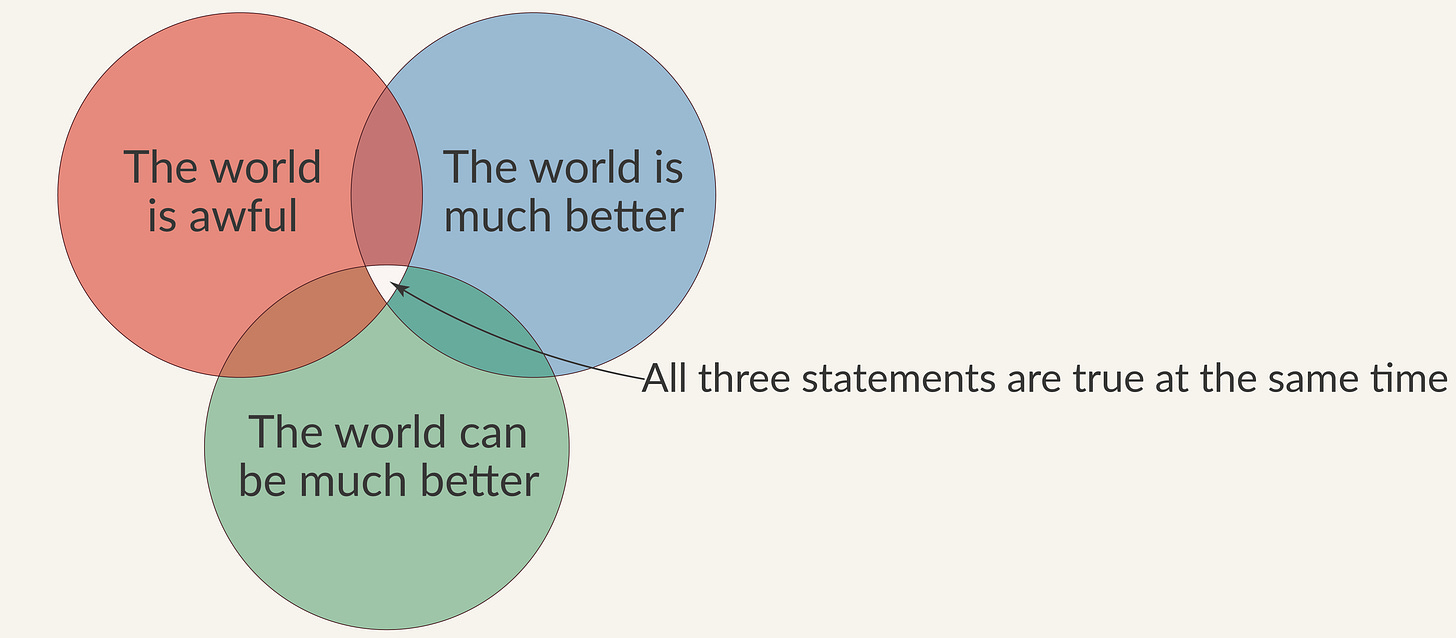
Let’s start with the most precious thing of all — life itself.
Imagine half of your kids not making it to adulthood. Every second child dies. Until the 1800s, that was the norm! Today, child mortality is down to 4.3%.
Our population has not exploded because we are reproducing like rabbits, but rather, we no longer die like flies…
Life expectancy: Global life expectancy has jumped from 32 years in 1900 to 73 years today. The percentage of people living in a democracy has increased from 1% in 1800 to nearly half of the world's population today.
Slavery: Slavery during the Roman Empire accounted for approximately 30% of the population, compared to 0.6% now (all illegally).
Literacy: In the 1500s, literacy was rare at 10%, but now over 85% can read and write. Primary school enrollment was unheard of in the 1800s, today 90% of kids get an education.
Poverty: In 1800, 90% of mankind was in extreme poverty — today, less than 10%. In just 100 years, global GDP per capita has increased by nearly an order of magnitude.
Death: Since the 1900s, you are 80% less likely to be a victim of homicide, 93% less likely to die in a car, and natural disasters kill 95% fewer people (thanks to better infrastructure) — and workplace deaths have dropped by 48% in just the last 20 years.
Food & Water: In 1900, over 50% of the population faced chronic hunger, and access to clean water was a luxury for fewer than 1%. Today, the rate is less than 9% for hunger, and 86% have safe access to water.
Labor: In 1900, we averaged 63 hours of work per week, today, only 38. Housekeeping required 58 hours a week, but is now 17 (thanks to washing machines, vacuum cleaners, dishwashers, stoves, microwaves, and refrigerators).
War: Historically, the human experience has been nonstop war with mere interludes of peace. Today, that has inverted — wars of all kinds have become fewer and less deadly, with 22x less death by battle than just a hundred years ago.
Happiness: In the last few decades, even happiness levels have risen dramatically in nearly every country.
To recap, in just the last hundred years we’ve gotten exponentially healthier, wealthier, wiser, safer, and happier.
People often think historical change happens in a moment. On geological time scales, this is that moment. This is what it feels like to live in an explosion.
Ok, so Earth is already unrecognizably better than just a few years ago, and we have luxuries our ancestors wouldn’t have even known were possible to dream for.… but what is the advantage of space? Why go to space at all? Why put humanities resources out there? We clearly still have issues, shouldn’t we direct everything we have towards fixing those?
A nun once had that exact question.
Nun Tells NASA Children are Starving to Death
In 1970, a Zambia-based nun named Sister Mary Jucunda wrote to Dr. Ernst Stuhlinger, then-associate director of science at NASA’s Marshall Space Flight Center, in response to his ongoing research into a piloted mission to Mars. Specifically, she asked how he could suggest spending billions of dollars on such a project at a time when so many children were starving on Earth.
Stuhlinger soon sent the following letter of explanation to Sister Jucunda, along with a copy of “Earthrise,” the above photograph of Earth taken in 1968 by astronaut William Anders, from the Moon. His thoughtful reply was later published by NASA, and titled, “Why Explore Space?”
The nearly 3,000 word letter reads as follows:
p.s. I know it’s long, but trust me it’s worth the read…
Dear Sister Mary Jucunda:
Your letter was one of many which are reaching me every day, but it has touched me more deeply than all the others because it came so much from the depths of a searching mind and a compassionate heart. I will try to answer your question as best as I possibly can.
First, however, I would like to express my great admiration for you, and for all your many brave sisters, because you are dedicating your lives to the noblest cause of man: help for his fellowmen who are in need.
You asked in your letter how I could suggest the expenditures of billions of dollars for a voyage to Mars, at a time when many children on this Earth are starving to death. I know that you do not expect an answer such as “Oh, I did not know that there are children dying from hunger, but from now on I will desist from any kind of space research until mankind has solved that problem!” In fact, I have known of famined children long before I knew that a voyage to the planet Mars is technically feasible. However, I believe, like many of my friends, that travelling to the Moon and eventually to Mars and to other planets is a venture which we should undertake now, and I even believe that this project, in the long run, will contribute more to the solution of these grave problems we are facing here on Earth than many other potential projects of help which are debated and discussed year after year, and which are so extremely slow in yielding tangible results.
Before trying to describe in more detail how our space program is contributing to the solution of our Earthly problems, I would like to relate briefly a supposedly true story, which may help support the argument. About 400 years ago, there lived a count in a small town in Germany. He was one of the benign counts, and he gave a large part of his income to the poor in his town. This was much appreciated, because poverty was abundant during medieval times, and there were epidemics of the plague which ravaged the country frequently. One day, the count met a strange man. He had a workbench and little laboratory in his house, and he labored hard during the daytime so that he could afford a few hours every evening to work in his laboratory. He ground small lenses from pieces of glass; he mounted the lenses in tubes, and he used these gadgets to look at very small objects. The count was particularly fascinated by the tiny creatures that could be observed with the strong magnification, and which he had never seen before. He invited the man to move with his laboratory to the castle, to become a member of the count’s household, and to devote henceforth all his time to the development and perfection of his optical gadgets as a special employee of the count.
The townspeople, however, became angry when they realized that the count was wasting his money, as they thought, on a stunt without purpose. “We are suffering from this plague,” they said, “while he is paying that man for a useless hobby!” But the count remained firm. “I give you as much as I can afford,” he said, “but I will also support this man and his work, because I know that someday something will come out of it!”
Indeed, something very good came out of this work, and also out of similar work done by others at other places: the microscope. It is well known that the microscope has contributed more than any other invention to the progress of medicine, and that the elimination of the plague and many other contagious diseases from most parts of the world is largely a result of studies which the microscope made possible.
The count, by retaining some of his spending money for research and discovery, contributed far more to the relief of human suffering than he could have contributed by giving all he could possibly spare to his plague-ridden community.
The situation which we are facing today is similar in many respects. The President of the United States is spending about 200 billion dollars in his yearly budget [almost $2 trillion in 2025]. This money goes to health, education, welfare, urban renewal, highways, transportation, foreign aid, defense, conservation, science, agriculture and many installations inside and outside the country. About 1.6 percent of this national budget was allocated to space exploration this year [less than .4 of one percent in 2025]. The space program includes Project Apollo, and many other smaller projects in space physics, space astronomy, space biology, planetary projects, Earth resources projects, and space engineering. To make this expenditure for the space program possible, the average American taxpayer with 10,000 dollars income per year is paying about 30 tax dollars for space. The rest of his income, 9,970 dollars, remains for his subsistence, his recreation, his savings, his other taxes, and all his other expenditures.
You will probably ask now: “Why don’t you take 5 or 3 or 1 dollar out of the 30 space dollars which the average American taxpayer is paying, and send these dollars to the hungry children?” To answer this question, I have to explain briefly how the economy of this country works. The situation is very similar in other countries. The government consists of a number of departments (Interior, Justice, Health, Education and Welfare, Transportation, Defense, and others) and the bureaus (National Science Foundation, National Aeronautics and Space Administration, and others). All of them prepare their yearly budgets according to their assigned missions, and each of them must defend its budget against extremely severe screening by congressional committees, and against heavy pressure for economy from the Bureau of the Budget and the President. When the funds are finally appropriated by Congress, they can be spent only for the line items specified and approved in the budget.
The budget of the National Aeronautics and Space Administration, naturally, can contain only items directly related to aeronautics and space. If this budget were not approved by Congress, the funds proposed for it would not be available for something else; they would simply not be levied from the taxpayer, unless one of the other budgets had obtained approval for a specific increase which would then absorb the funds not spent for space. You realize from this brief discourse that support for hungry children, or rather a support in addition to what the United States is already contributing to this very worthy cause in the form of foreign aid, can be obtained only if the appropriate department submits a budget line item for this purpose, and if this line item is then approved by Congress.
You may ask now whether I personally would be in favor of such a move by our government. My answer is an emphatic yes. Indeed, I would not mind at all if my annual taxes were increased by a number of dollars for the purpose of feeding hungry children, wherever they may live.
I know that all of my friends feel the same way. However, we could not bring such a program to life merely by desisting from making plans for voyages to Mars. On the contrary, I even believe that by working for the space program I can make some contribution to the relief and eventual solution of such grave problems as poverty and hunger on Earth. Basic to the hunger problem are two functions: the production of food and the distribution of food. Food production by agriculture, cattle ranching, ocean fishing and other large-scale operations is efficient in some parts of the world, but drastically deficient in many others. For example, large areas of land could be utilized far better if efficient methods of watershed control, fertilizer use, weather forecasting, fertility assessment, plantation programming, field selection, planting habits, timing of cultivation, crop survey and harvest planning were applied.
The best tool for the improvement of all these functions, undoubtedly, is the artificial Earth satellite. Circling the globe at a high altitude, it can screen wide areas of land within a short time; it can observe and measure a large variety of factors indicating the status and condition of crops, soil, droughts, rainfall, snow cover, etc., and it can radio this information to ground stations for appropriate use. It has been estimated that even a modest system of Earth satellites equipped with Earth resources, sensors, working within a program for worldwide agricultural improvements, will increase the yearly crops by an equivalent of many billions of dollars.
The distribution of the food to the needy is a completely different problem. The question is not so much one of shipping volume, it is one of international cooperation. The ruler of a small nation may feel very uneasy about the prospect of having large quantities of food shipped into his country by a large nation, simply because he fears that along with the food there may also be an import of influence and foreign power. Efficient relief from hunger, I am afraid, will not come before the boundaries between nations have become less divisive than they are today. I do not believe that space flight will accomplish this miracle over night. However, the space program is certainly among the most promising and powerful agents working in this direction.
Let me only remind you of the recent near-tragedy of Apollo 13. When the time of the crucial reentry of the astronauts approached, the Soviet Union discontinued all Russian radio transmissions in the frequency bands used by the Apollo Project in order to avoid any possible interference, and Russian ships stationed themselves in the Pacific and the Atlantic Oceans in case an emergency rescue would become necessary. Had the astronaut capsule touched down near a Russian ship, the Russians would undoubtedly have expended as much care and effort in their rescue as if Russian cosmonauts had returned from a space trip. If Russian space travelers should ever be in a similar emergency situation, Americans would do the same without any doubt.
Higher food production through survey and assessment from orbit, and better food distribution through improved international relations, are only two examples of how profoundly the space program will impact life on Earth. I would like to quote two other examples: stimulation of technological development, and generation of scientific knowledge.
The requirements for high precision and for extreme reliability which must be imposed upon the components of a moon-travelling spacecraft are entirely unprecedented in the history of engineering. The development of systems which meet these severe requirements has provided us a unique opportunity to find new material and methods, to invent better technical systems, to manufacturing procedures, to lengthen the lifetimes of instruments, and even to discover new laws of nature.
All this newly acquired technical knowledge is also available for application to Earth-bound technologies. Every year, about a thousand technical innovations generated in the space program find their ways into our Earthly technology where they lead to better kitchen appliances and farm equipment, better sewing machines and radios, better ships and airplanes, better weather forecasting and storm warning, better communications, better medical instruments, better utensils and tools for everyday life. Presumably, you will ask now why we must develop first a life support system for our moon-travelling astronauts, before we can build a remote-reading sensor system for heart patients. The answer is simple: significant progress in the solutions of technical problems is frequently made not by a direct approach, but by first setting a goal of high challenge which offers a strong motivation for innovative work, which fires the imagination and spurs men to expend their best efforts, and which acts as a catalyst by including chains of other reactions.
Spaceflight without any doubt is playing exactly this role. The voyage to Mars will certainly not be a direct source of food for the hungry. However, it will lead to so many new technologies and capabilities that the spin-offs from this project alone will be worth many times the cost of its implementation.
Besides the need for new technologies, there is a continuing great need for new basic knowledge in the sciences if we wish to improve the conditions of human life on Earth. We need more knowledge in physics and chemistry, in biology and physiology, and very particularly in medicine to cope with all these problems which threaten man’s life: hunger, disease, contamination of food and water, pollution of the environment.
We need more young men and women who choose science as a career and we need better support for those scientists who have the talent and the determination to engage in fruitful research work. Challenging research objectives must be available, and sufficient support for research projects must be provided. Again, the space program with its wonderful opportunities to engage in truly magnificent research studies of moons and planets, of physics and astronomy, of biology and medicine is an almost ideal catalyst which induces the reaction between the motivation for scientific work, opportunities to observe exciting phenomena of nature, and material support needed to carry out the research effort.
Among all the activities which are directed, controlled, and funded by the American government, the space program is certainly the most visible and probably the most debated activity, although it consumes only 1.6 percent of the total national budget, and 3 per mille (less than one-third of 1 percent) of the gross national product. As a stimulant and catalyst for the development of new technologies, and for research in the basic sciences, it is unparalleled by any other activity. In this respect, we may even say that the space program is taking over a function which for three or four thousand years has been the sad prerogative of wars.
How much human suffering can be avoided if nations, instead of competing with their bomb-dropping fleets of airplanes and rockets, compete with their moon-travelling space ships! This competition is full of promise for brilliant victories, but it leaves no room for the bitter fate of the vanquished, which breeds nothing but revenge and new wars.
Although our space program seems to lead us away from our Earth and out toward the moon, the sun, the planets, and the stars, I believe that none of these celestial objects will find as much attention and study by space scientists as our Earth. It will become a better Earth, not only because of all the new technological and scientific knowledge which we will apply to the betterment of life, but also because we are developing a far deeper appreciation of our Earth, of life, and of man.
The photograph which I enclose with this letter shows a view of our Earth as seen from Apollo 8 when it orbited the moon at Christmas, 1968. Of all the many wonderful results of the space program so far, this picture may be the most important one. It opened our eyes to the fact that our Earth is a beautiful and most precious island in an unlimited void, and that there is no other place for us to live but the thin surface layer of our planet, bordered by the bleak nothingness of space. Never before did so many people recognize how limited our Earth really is, and how perilous it would be to tamper with its ecological balance. Ever since this picture was first published, voices have become louder and louder warning of the grave problems that confront man in our times: pollution, hunger, poverty, urban living, food production, water control, overpopulation. It is certainly not by accident that we begin to see the tremendous tasks waiting for us at a time when the young space age has provided us the first good look at our own planet.
Very fortunately though, the space age not only holds out a mirror in which we can see ourselves, it also provides us with the technologies, the challenge, the motivation, and even with the optimism to attack these tasks with confidence. What we learn in our space program, I believe, is fully supporting what Albert Schweitzer had in mind when he said: “I am looking at the future with concern, but with good hope.”
My very best wishes will always be with you, and with your children.
Very sincerely yours,
Ernst Stuhlinger, Associate Director for Science
Dr. Stuhlinger made some critical points:
Technology is ultimately what raises living standards
Space exploration is an unprecedented engineering challenge
Scientific progress is often made through an indirect approach, and it’s basically impossible to predict the second-order effects of new technology
But isn’t Space Super Expensive?
Americans wildly overestimate how much money NASA gets each year. In fact, when asked by Business Insider in 2018, some answers to the question were so extreme that the top 5% of responses had to be removed to show a more representative result.
This disconnect from reality has caused many people to call for cutting NASA's funding. In May 2025, a national survey asked the public which federal programs should be reduced to address the budget deficit, and NASA was the top candidate, with 63% favoring a reduction. Yet NASA's budget is a pittance compared to other government expenditures.
And what does that meager amount of money get us? From a purely Earth-centric point of view, space exploration is a marvelous return on investment.
Do you like the internet, your GPS, your cellphone, and your seven-day weather forecasts? None of those would be possible without space exploration.
I could go into detail on each thing that space has given us, but it would literally require a textbooks amount of text. Instead, here’s an annoyingly long and jumbled list. Feel free to do research yourself:
GPS navigation, ride share, food delivery, package tracking, health monitors, emergency alerts, search & rescue, weather forecasts, natural disaster prediction & response, aviation collision avoidance, maritime navigation, scratch-resistant lenses, UV protection, ear thermometers, shoe insoles, invisible braces, cordless tools, water filters, memory foam, solar panels, pacemakers, heart rate sensors, chemotherapy, LASIK eye surgery, hearing aids, artificial limbs, osteoporosis drugs, vaccine research, asthma research, Alzheimer’s research, HIV research, ultrasounds, MRI scanners, baby formula, air scrubbers, LEDs, traffic lights, anti-icing fluid, highway grooving, modern smoke detectors, modern tires, modern batteries, modern refrigerators, modern thermostats, modern air conditioning, modern transistors, modern vacuums, modern Velcro, CO2 sensors, soil moisture sensors, clock syncing, disease outbreak detection, insulin pumps, emergency blankets, freeze-dried food, firefighting gear, fire-resistant paint, shock absorbers, hospital ventilators, LIDAR, night vision, digital cameras, the computer mouse, bar codes, insulation, food safety standards, crop yield detection, wireless headsets, landmine removal …and much, much more.
To Inspire a New Generation
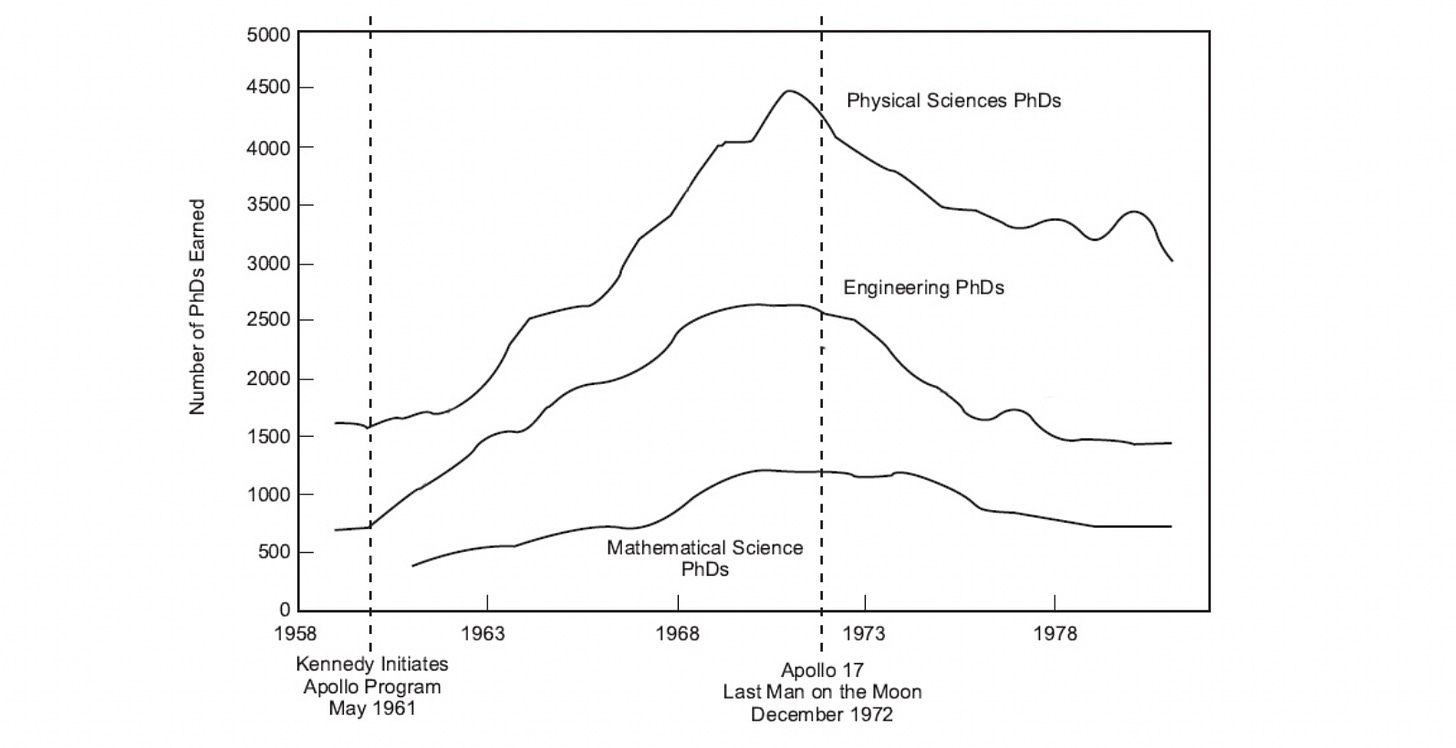
A 2009 survey found that fifty percent of the internationally renowned scientists who published in the prestigious journal Nature during the previous three years had been inspired by Apollo to become scientists. And to be clear, this is not an isolated incident.
Constraint is the Parent of Innovation
Scientific progress often occurs in indirect ways, yet certain key elements tend to be present. Space exploration beautifully encapsulates all of these important ingredients.
In an increasingly complex and challenging environment, we must learn to do more with less. As any engineer will tell you, constraints breed resourcefulness, and the highest form of creativity is found by improvising within a set of restrictions. As Dr. Stuhlinger put so elegantly in his letter:
“Significant progress in the solutions of technical problems is frequently made not by a direct approach, but by first setting a goal of high challenge which offers a strong motivation for innovative work, which fires the imagination and spurs men to expend their best efforts, and which acts as a catalyst by including chains of other reactions.”
Today, we can measure the literal hundreds of trillions of dollars of value that space exploration has created for humans! And we have only begun to discover what’s possible.
But beyond fixing Earth, there’s a deeper imperative: survival.
A Defensive Reason to become Multiplanetary
How do you rationally decide that anything is important? History is the best lens. If you look at things over a long enough span of time, the things that are less important fall away.
Primitive life started around 3.5 billion years ago. What were the most important steps in the evolution of life?
Advent of single-celled life
Differentiation to plants and animals
Life going from oceans to land
Mammals
Consciousness
Life becoming multiplanetary also fits on that scale, in fact, it’s the very next step.
Because you need consciousness to design vehicles that can transport life over hundreds of millions of miles of irradiated space to an environment they did not evolve to exist. It would be very convenient for life if there were another planet just like Earth nearby, but that would be unlikely, and as it turns out, not the case. There is no way for life, by means of natural selection, to get to Mars and survive.
If one could make a reasonable argument that something is important enough to fit on the scale of evolution, then maybe it’s worth a bit of our resources. We know for a fact that before 500 million years from now, as the sun continues to warm, photosynthesis will no longer be possible, and all life as we know it will cease to exist.
If we compressing Earth’s 4.5-billion-year history into a single human lifetime of about 80 years, our planet is now around 70 years old.
But humans are much more likely to become extinct much sooner.
From natural causes such as asteroid impacts, supervolcanic eruptions blocking out the sun, solar flares sending our infrastructure back to the dark ages, or Gamma-ray bursts depleting our protective ozone layer — to recently possible manmade disasters like nuclear holocaust, a mass bioweapon, runaway artificial intelligence, ecological collapse, or even just population decline.
“Dithering on space exploration is not just a waste of human destiny, it is also a gamble with the continued existence of introspective intelligence in the universe. There is no time to waste - we should go as soon as it is possible, starting now.”
— Dr. Casey Handmer
There Have Already Been Five Major Extinction Events
We’ve been down to less than 10,000 people before. There is clear evidence of life being destroyed multiple times in the fossil record. So we don’t need to guess if this is something that can occur — it has already occurred.
There have been five major mass extinction events, known as the “Big Five,” over the last 450 million years, including the Ordovician-Silurian, Late Devonian, Permian-Triassic, Triassic-Jurassic, and Cretaceous-Paleogene extinctions. These events each resulted in the loss of a large percentage of the Earth’s species and are identified by fossil records and geological changes. Scientists also believe the planet is currently undergoing a potential sixth mass extinction, driven by human activities.
The Permian extinction is a particularly interesting one because it destroyed between 90-95% of species on Earth. The majority of the remaining species were fungi, so unless you were a mushroom, you were out of luck.
One could consider space exploration from the perspective of life insurance. If we think it’s worth buying life insurance on an individual level, perhaps it’s worth spending something on life insurance to protect life as we know it.
If we are on more than one planet, the probable life span and the light of consciousness are going to be far greater than if we are on just one planet. Earth has been around for 4 billion years, and civilization about 10,000 years, and it’s only now that this little window has just cracked open, where it’s possible for life to extend beyond Earth.
It seems sensible to take advantage of that window while it’s open. Hopefully, it will be open for a long time, but it could be open for a short time. So we should take action!
A Positive Reason to Become Multiplanetary
But doomerism does not need to be the only reason we go. Space exploration is literally the most inspiring and interesting thing we can do. It is the greatest adventure that humanity could ever embark upon. Life has to be more than solving problems. If life is only about solving problems, why get up in the morning? We need more great endeavors to inspire us and make us feel positive and optimistic about humanity.
These are points SpaceX founder Elon Musk presents in the following video:
There must be things that make you proud to be a member of humanity.
The Apollo program is a great example. Only a handful of people went to the moon, yet actually, we all went to the moon together. We went with them vicariously. We shared in that adventure. We need more of those things. Even for people in a different industry or a different walk of life, it is still something that makes you feel good about the world!
Dr. Robert Zubrin, a long-time proponent of space exploration, aerospace engineer, and author, sums up his top three reasons for Mars in the following video:
There are three reasons why humanity should go to Mars:
THE SCIENCE
If we’re interested in the origins of life, it is easier to see that on Mars than on Earth, because on Earth, the evidence has been wiped away.
Mars is the Rosetta Stone for life in the universe.
It was once a warm and wet planet with water on its surface for over a billion years. On Earth, once water was on the surface, it only took 200 million years for life to appear. So if the theory of life as a natural development from chemistry is correct, life should’ve appeared on Mars even if it went extinct. If we go to Mars and find fossils of past life, we can prove that the development of life is a general phenomenon elsewhere in the universe.
Alternatively, if we were to go to Mars and find evidence of past water but no fossils, that would imply that life is not a natural development of chemistry that occurs with high probability, and we could be alone in the universe.
Furthermore, if we go to Mars and drill into its groundwater, we could find life there now. Would Mars life be the same as Earth life? All Earth life at the biochemical level is the same. It all uses the same amino acids and the same method of replicating and transmitting information through RNA/DNA. Is that what life has to be? Or could life be very different from that? Are we what life is? Or are we just one example drawn from a much vaster tapestry of possibilities?
This is real science. These are fundamental questions that thinking men and women have wondered about for thousands of years. The role of life in the universe.
THE CHALLENGE
Societies are like individuals – we grow when we challenge ourselves, we stagnate when we do not. Embracing the challenge of Mars is incredibly productive for innovation and ingenuity, particularly among youth. Going to Mars will tell every kid in school today that “if you learn your science, you too can become an explorer of new worlds.”
This will create millions of new scientists, engineers, inventors, entrepreneurs, doctors, and medical researchers. The intellectual benefits alone dwarf the costs.
THE FUTURE
Mars is the closest planet that has all the resources necessary to support life.
If we do what we are capable of in our time to establish a Plymouth Rock settlement on Mars, 500 years from now, there will be new branches of human civilization on Mars and throughout interstellar space.
If you ask any American, what happened in 1492? They’ll tell you, “Columbus sailed in 1492”, and that is correct — he did. But that’s not the only thing that happened in 1492.
In 1492, France and England signed a peace treaty. In 1492, Rodrigo Borgia scandalously took over the papacy. In 1492, Lorenzo de’ Medici, one of the richest men in the world, died. If there had been newspapers in 1492, those stories would’ve been what were written about — not some Italian weaver’s son taking a bunch of ships and sailing off to nowhere.
But Columbus is what we remember. In 500 years, no one will care what faction came out on top in Iraq, but they will care what we did to make their civilization possible.
This is the most important thing we can do at this time. If you have it in your power to do something great and important and wonderful — then you should.
So, why Mars and not another Celestial Body?
It’s the closest and most similar to Earth.
Venus and Mercury are far too hot for life, and anything Earth-like past Mars, such as Saturn’s moon Titan, would take 6+ years to reach.
What about the Moon?
It’s much smaller than a planet
Doesn’t have any atmosphere
Not as resource-rich
Has a 28-day day (Mars day is 24.5 hrs)
On the other hand, Mars & Earth are very similar, and both have all the resources necessary to sustain life.
We Choose to Go Because it is Hard.
Some consider space exploration to be dangerous, impractical, and difficult — and it is — that is the point.
What if we were not an adventuring species and had all remained in Africa since the dawn of humanity? How significant a population would Africa have supported before a predator or nature wiped us out?
Mars is the next step for humanity to continue as a species.
There’s nowhere left to explore on Earth. You can literally get anywhere in 24 hours or less. You could fly over the Antarctic pole or Mt. Everest and parachute out, or go to the bottom of the ocean in a submarine. From a physical standpoint, on Earth, you can go anywhere.
There is no physical frontier on Earth anymore — space is that frontier. Settling Mars is the next great challenge and an appeal to anyone with an exploratory spirit.
“To boldly go where no man has gone before.”
— Captain Kirk, Star Trek
Humanity is drawn to the frontier. We desire a horizon to focus our energies. We make heroes out of those who brave those frontiers — even if they do not return — because they act out something ancient and important in us.
We are a Species of Explorers
The first humans left their caves to climb mountains. Just 130 years ago, humans sailed further and further south until they saw the glacial landscapes of Antarctica for the first time.
What is the common denominator in our history? Exploration.
Take the remarkable expansion of the Polynesians across the vast expanse of the Pacific Ocean. The expansion was initially rapid, as long as new islands to be settled were in visible range of those already inhabited. But once the open ocean was reached, the expansion halted until what is today South China provided the next boost in terms of a new technology, better ships. With the technology, the Polynesians pushed onward and eventually reached as far as the Americas.
Once again we are poised at the edge of a great sea. This time it’s called space.
Human nature is characterized by a propensity to travel, to look further and to discover. We are all curious by nature. If we stop wanting to explore, we stop being human.
That is why space matters. While some say we need to clean up our act at home before we venture outward, the irony is that these two needs are linked.
We can only learn to preserve our own planet when we discover how planets work. Space exploration provides us with the much-needed understanding of Earth’s functionality as a planet in its entirety.
SpaceX
The pivotal breakthrough that is necessary to make life multiplanetary is a reusable orbit-class rocket. This is obvious when applied to any other mode of transport. If planes were not reusable, very few people would fly.
Today, SpaceX is the only entity — country or company — to have achieved these fully and rapidly reusable rockets. In addition, while a handful of countries are racing to establish small bases on the moon, SpaceX is the only entity working to develop human civilization on another planet.
The team at SpaceX is rapidly developing a much larger vehicle, Starship (see below), to transport millions of tons of cargo to Mars as quickly and cheaply as possible.
SpaceX’s single goal is to make humanity multiplanetary. This goal influences every aspect of the company — from job descriptions to internal communications — guiding the decisions of its 16,000 employees.
“It’s very important to appreciate, this is not inevitable. People are mistaken when they think that technology just automatically improves. It does not automatically improve. If you look at great civilizations like ancient Egypt, they were able to make the pyramids… and they forgot how to do that. Then the Romans built these incredible aqueducts… and they forgot how to do it. In 1969 we were able to send someone to the moon… and we forgot how to do that. The window of opportunity is open right now to make life multiplanetary. But we cannot count on it being open for a long time. We need to take advantage of that window while it is open.”
— Elon Musk
Humankind is a Story of Growth
Chris Power, the founder of Hadrian, echoes the case for space in an interview with VC firm a16z.
“…it comes down to growth or degrowth. Are we going to use the limited resources on the planet to go get new resources so we can continue this magical species-wide journey of settling the solar system… or are we going to accept the status quo, and continue to shit in a hole instead of inventing the toilet?”
“Space is the last frontier we have, the moon is the eighth continent, and as a species we must continue to grow… else we stagnate, and if anyone’s choosing to stagnate, I’m sorry but you’re on the wrong side of history. You will be blown past by everyone else.”
The full 7-min video is here:
…and so we go
Today, the poorest among us live better than kings did a century ago. We stand on the shoulders of giants and must continue the race that our ancestors have all successfully run. The baton is firmly in our hands, and we must continue the race to the edge.
What we do now over the next 100 years will determine the course of the next millennium. If we stay on Earth, we eventually die out, and the wonders of the universe will forever remain unexplored.
We must reject that possibility and choose growth, there is no time to waste.
Thank you for reading.
– David


